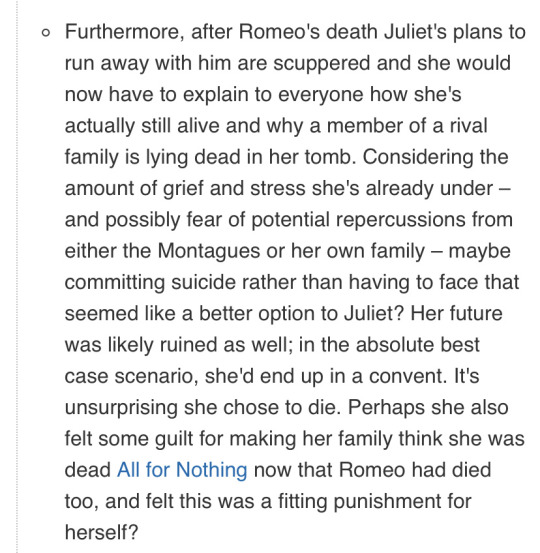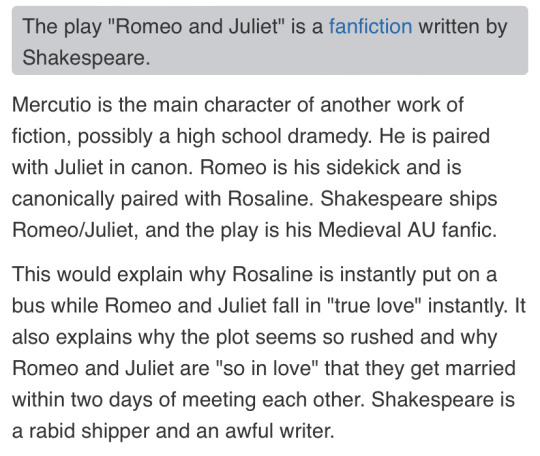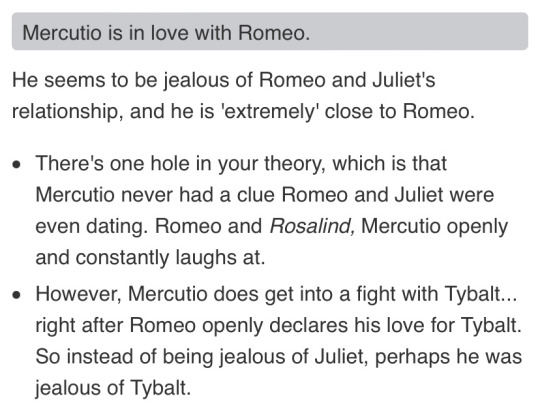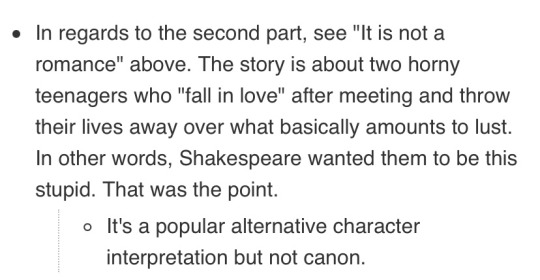#i remember just saying that mercutio’s sexuality isn’t stated in-text and an angry baby fan tried to eat my fingers
Text
R&J Clown Takes Special Edition—TV Tropes Still Exists Part 2
A bit more entertaining this time, though. TV Tropes has indeed been improving, if only slightly. But clownery is still clownery, and it must be eaten, and by me! So hie ho, here we go
Meta Fanfiction

2006-era Albus Dumbledore HP meta was a mistake. I have a whole Friar meta to prove it.


Cool fanfic, bruh.
No, seriously, this was entertaining, even (dare I say it?) reasonable enough…except that Shakespeare literally wrote none of this.
He gave no indication that R&J’s deaths were the result of their guilt or loss or even honor-based motives. The only possible indication would be Romeo asking Tybalt for forgiveness, but there is nothing in the text that suggests that he is punishing himself for Tybalt’s death by dying, only that he regrets killing him. All in all, it’s just one loose end to tie up, as Romeo did regret killing Tybalt.
As for Juliet, Shakespeare gave Juliet (1) choice—the Friar plans for Juliet to go to convent after Romeo’s death and begs her to come with him. Juliet rejects this implicitly and explicitly (~“Go, for I will not away!”). So if she was worried about how to explain to her parents that she’s alive, that problem already had a solution re: the Friar.
Either way, it’s clear by the language of their suicides their suicides were not honor-killings like Brutus’, Othello’s, and even Horatio’s suicide attempt. R&J do not talk about death, though their diction is colored by it. They are completely focused on each other.

…Not so cool fanfic, bruh.
Shakespeare’s R&J is an adaptation of Arthur Brooke’s narrative poem The Tragicall Historie of Romeus and Juliet. This is literally documented fact, not theory. Shakespeare also consulted other sources, but the plot and characters are pure Brooke’s.
I have read the poem multiple times and done a review series of it, but even in that mess of a poem Romeus/Juliet is the main and only canon ship. The only difference is that Brooke!Romeus/Juliet is based on youthful lust and their tragic end is explicitly framed as a “They Had It Coming For Disobeying Their Parents” Aesop. Shakespeare yeeted this morality framing so hard out the window it reached space and was sucked into the moon’s orbit. Legend says it’s still orbiting there, along with all of Shakespeare’s last remaining fucks.
As for Mercutio, Brooke!Mercutio is a random courtier who flirted with Juliet at the ball and held her hand, but Juliet preferred Romeus, whose hand was warmer (not even joking, the poem explicitly calls out Brooke!Mercutio’s cold hands). After that Brooke!Mercutio completely disappears from the poem. He was never an actual character, let alone the main one.

The Romercutio shippers have arrived!!! And shamelessly trying to frame Romeo’s “The love I bear thee” thing to Tybalt as actual romantic love, lol.
Friendly reminder that in Shakespeare’s time “love” can be used for platonic situations. In some contexts it can even mean “honor” and “duty”—as in, the ~love a servant is supposed to show his master. Yes, the Elizabethans weaponized “love” to uphold the status quo in the same way we modern people have weaponized “respect.”

And yet they are supposedly Bromantic Foils per the page. TV Tropes still gotta TV-Trope.
(But at least someone did notice that discrepency, lol. I was about to make a whole meta on why that’s so.)

…Okay, this is creative, I’ll give you that.
Mercutio did not know Romeo was in love with Juliet. The most he would have been aware of Juliet’s existence if he kept up with news of his cousin Paris’ attempts to court her. He did not love anybody in the play, which is why most shippers are so hungry to pair him up with literally anyone.
Illegal Marriage!!!!

Le sigh.
So I’m not an expert on marriage laws at the time, BUT I’m 99.999% sure that the age of consent for marriage was way lower than 21–remember the nobles and their alliances! 21-23 were the median ages to get married, though.
Also, from I understand the Elizabethan audience would have completely understood this play was set in a time when Catholic marriage was a thing (troth plight where the couple pledges to marry without a friar). After all, a good chunk of Elizabethan society was still Catholic—loyal to the Queen, of course, but much of the rites had been kept even in the official new Protestant church.
If anything, Romeo and Juliet followed the new Protestant ethic of being married in church by Friar. If they consummated their union, parental approval or not, they were married. Nothing their parents could do. And Juliet at that point was not betrothed to Paris.
One Based Reply

Arthur Brooke: Their youthful lust led to their ignominious doom!!!1!1!!
Shakespeare: It’s a popular alternative character interpretation but not canon
Arthur Brooke:
Shakespeare: My canon, that is 😎
#romeo and juliet#william shakespeare#rj clownery#r&j clown takes#rj clown takes#tv tropes#also that ‘he appears to be straight’#careful op the gay!mercutio fans will kill you!!!#shhh#i remember just saying that mercutio’s sexuality isn’t stated in-text and an angry baby fan tried to eat my fingers
13 notes
·
View notes